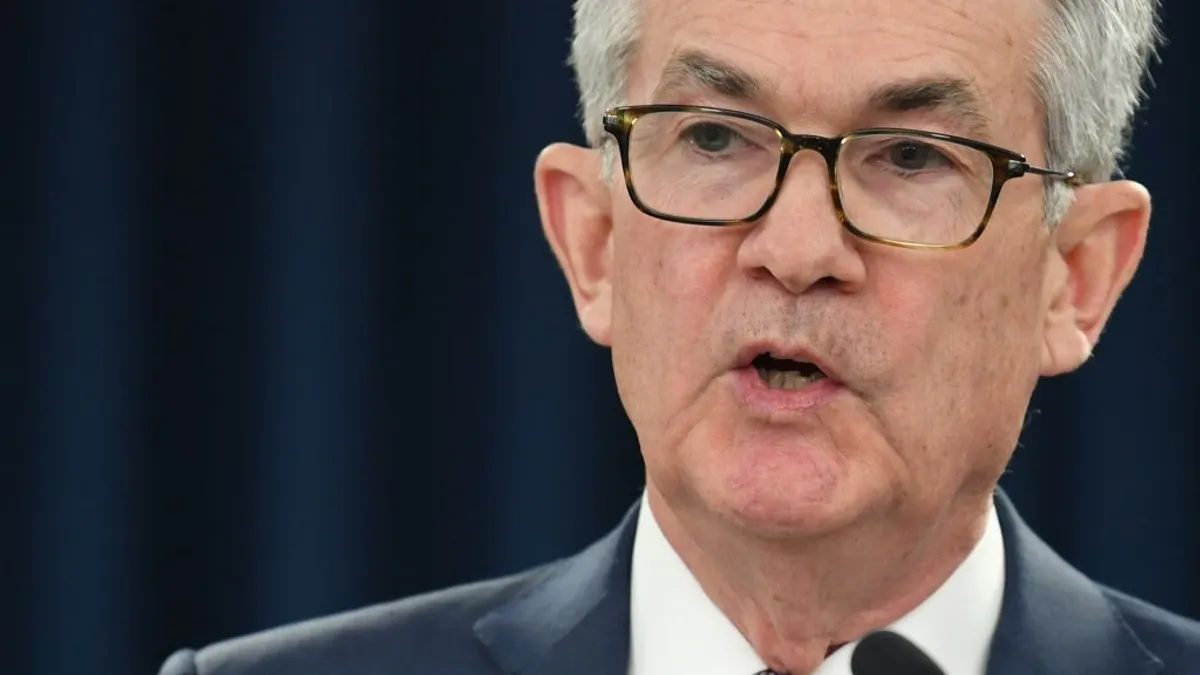Dive Brief:
- Federal Reserve Chair Jerome Powell predicted on Friday that sweeping tariffs enacted by the Trump administration will spur inflation, slow growth and jar the economy more than initially forecast.
- “It is now becoming clear that the tariff increases will be significantly higher than expected,” Powell said in a speech. “The same is likely to be true of the economic effects, which will include higher inflation and slower growth.”
- The Fed intends to keep monetary policy unchanged until the impact of shifts to U.S. trade, tax, regulation, and immigration policies becomes clearer, Powell said. “We don’t need to be in a hurry,” he said in reply to a question. “It’s not clear at this time what the appropriate path for monetary policy will be, and we’re going to need to wait and see how this plays out before we can start to make those adjustments.”
Dive Insight:
Powell said that despite the hazy outlook for growth, a range of economic data have recently shown signs of strength.
“While uncertainty is high and downside risks have risen, the economy is still in a good place,” he said. “The incoming data show solid growth, a labor market in balance and inflation much closer to, but still above, our 2% objective.”
Indeed, U.S. employers added 228,000 jobs last month, higher than expected, and unemployment rose just 0.1 percentage point to 4.2%, the Labor Department reported Friday, a few hours before Powell spoke.
While saying that the report “still shows a solid economy,” Powell noted that the Labor Department gathered the employment data before mid-March, weeks before the Trump administration’s announcement of widespread import duties.
Powell flagged the risk that, if growth slows, unemployment rises and inflation heats up, the Fed may encounter “tension” between both requirements of its dual congressional mandate to ensure price stability and maximum employment.
“Higher unemployment would call for speeding up the economy and high inflation would call for slowing it down,” Powell said.
Faced with such a dilemma, policymakers would assess how far inflation and employment have strayed from their goals and the likely time needed to correct the deviations, he said.
“We weigh those things and make a decision about what to do,” he said. “That’s a difficult situation.”
Minutes before Powell warned in his speech that planned import duties will stoke price pressures, President Donald Trump urged the Fed chair to reduce the federal funds rate.
“This would be a PERFECT time for Fed Chairman Jerome Powell to cut Interest Rates,” Trump said on Truth Social. “He is always `late,’ but he could now change his image, and quickly,” the president said, adding “CUT INTEREST RATES, JEROME, AND STOP PLAYING POLITICS!”
Powell reiterated his position that he avoids reacting to comments by politicians in order to shield the Fed against political interference.
“We have this great thing called our independence of monetary policy, and that's critical for us to be able to do our job,” he said, adding that the Fed will focus solely on its dual mandate.
“For us to keep that independence, we need to not succumb to the temptation to want to be a player on issues that are not assigned to us, and trade policy is one of those.”
Trump announced on Wednesday a 10% baseline tariff on all imports and reciprocal tariffs ranging as high as 34% for China.
The U.S. policy reversal from decades of free trade — and the apparent end to an era of globalization — triggered a two-day plunge in stock prices and downward revisions to growth forecasts by several private sector economists.
JPMorgan Chase on Thursday raised the odds of a U.S. recession to 60% from 40%.
On Friday the Nasdaq, Standard & Poor’s 500 index and Dow Jones Industrial all fell at least 5.5%.














